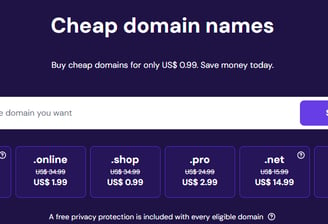Cheap Domains for Small Businesses
Discover the essentials of cheap domains and how choosing the right domain name can elevate your small business online. Learn tips for selecting a memorable and budget-friendly domain to enhance your brand recognition and improve search engine rankings.
DOMAINSMALL BUSINESSCHEAP DOMAINS
cheapdomainspace.com
5/13/20258 min read


Understanding Affordable Domains: What You Need to Know
When embarking on the journey of establishing an online presence, small business owners must first grasp the concept of a domain name. A domain name is essentially the address of your website on the Internet, acting as a crucial component that helps users locate your business online. For instance, a memorable domain name can not only boost brand recognition but also contribute to improved search engine rankings. Thus, selecting an affordable domain is a fundamental step for those operating on a budget.
In choosing a budget-friendly domain name, small business owners should prioritize simplicity and relevance. This involves selecting a name that is easy to spell, pronounce, and remember. Additionally, incorporating relevant keywords into the domain can enhance search engine optimization (SEO), driving more traffic to the website. Availability is another critical factor; many desirable domain names may already be taken, prompting business owners to think creatively or consider alternative extensions, such as .net, .co, or even niche-specific TLDs.
Furthermore, it’s essential to evaluate the domain registration costs and renewal fees, as these can vary significantly between providers. Some hosting companies offer promotional rates for the first year, but it is vital to consider the long-term expenses associated with the domain. Ensuring that the domain is not only affordable but also worthwhile for the projected duration of your website is a prudent step in managing overall costs.
Common pitfalls include opting for overly complex or lengthy names, which can lead to user confusion and loss of potential traffic. Misunderstanding the implications of domain ownership is another critical issue; business owners should ensure they maintain control over their registered domains to avoid complications in the future. By thoroughly researching and understanding these aspects, small business owners can confidently select an affordable domain that aligns with their vision and budget.
Exploring Budget Web Hosting Options
When embarking on the journey of establishing a website, one of the most critical decisions is selecting an appropriate web hosting service. There are several budget web hosting options available today, catering to different needs and offering varying features. Small business owners must understand these options to choose the most suitable one without straining their finances.
The three primary types of hosting to consider include shared hosting, virtual private server (VPS) hosting, and dedicated hosting. Shared hosting is the most economical choice, where multiple websites are hosted on a single server. This option is ideal for startups and low-traffic websites since it provides adequate functionality at a fraction of the cost. However, it’s essential to verify the reliability and performance metrics of shared hosting providers, as poor service can impede your website's user experience.
VPS hosting serves as a middle ground between shared and dedicated hosting. It offers more robust resources and improved performance, as the server is partitioned to create separate virtual servers for each user. While this option is slightly more expensive, it offers increased control and flexibility, making it a viable choice for growing businesses anticipating higher traffic. Entrepreneurs should assess their current and projected needs when considering this option.
Dedicated hosting, though generally the highest in price, provides exclusive server resources. It is suitable for large enterprises or websites with high traffic volumes. For budget-conscious business owners, it’s often best to start with shared or VPS hosting and migrate to dedicated hosting as their needs grow.
When selecting a hosting provider, key features to look for include uptime guarantees, customer support availability, scalability options, and pricing transparency. Comparing hosting plans and reading reviews can aid in making an informed decision. This careful assessment will help business owners identify cost-effective solutions that meet their website needs while staying within budget.
The Importance of Choosing the Right Domain and Hosting Provider
When starting a website, particularly for small business owners, selecting the right domain name and hosting provider is paramount. These foundational elements not only influence the technical functionality of a website but also significantly affect user experience and the overall perception of a brand. A reliable hosting service ensures that a website operates smoothly and efficiently; downtime or slow loading speeds can deter visitors, impacting traffic and conversion rates.
Moreover, the performance of a website is closely tied to its hosting provider. Quality hosting services often feature robust security measures, automated backups, and scalable resources that accommodate the growth of a business. In contrast, unreliable hosting can lead to frustrating experiences, causing potential customers to abandon the site, which can ultimately affect search engine rankings. Search engines prioritize websites that offer quick load times and minimal downtime, thereby linking good hosting practices to improved online visibility.
Equally important is the choice of a domain name. A well-thought-out domain name can significantly enhance a brand's identity, making it easier for customers to remember and recognize a business. It acts as the first impression for potential clients and should reflect the nature of the business while being simple and engaging. Utilizing keywords associated with the business can also help in search engine optimization (SEO), increasing the chances of attracting organic traffic.
In conclusion, the right domain and hosting choice is instrumental to achieving sustainable online success. By investing time in selecting reputable hosting services and an attractive domain name, small business owners can enhance performance, improve user experience, and build a solid brand identity that resonates with their target audience.
Step-by-Step: How to Start a Website Cheap
Starting a website on a budget involves several actionable steps that can help small business owners establish their online presence without significant financial strain. The journey begins with selecting an appropriate domain name. Choose a name that is not only relevant to your business but also easy to remember and type. Using a domain name registrar, you can check the availability of your preferred name and register it at a low cost. Look for promotions or discounts that many registrars provide, especially for first-time customers.
Once you have secured a domain name, the next step is to select a budget-friendly hosting plan. There are various types of hosting services available, such as shared, VPS, and dedicated hosting. For most small businesses, shared hosting is the most economical option, providing sufficient resources for a startup website. When choosing a hosting provider, compare pricing, features, and customer reviews to ensure reliability and value. Many hosts also offer free domain registration if you purchase a hosting plan, which can help reduce initial expenses.
After settling on a domain and hosting, the next phase is to utilize website builders or content management systems (CMS) that are user-friendly and often free. Popular options include WordPress, Wix, and Squarespace, all of which provide customizable templates suitable for different business types. These platforms enable users to design their websites without requiring extensive technical knowledge. Once you've selected a builder, follow their tutorials to set up your website by adding essential pages such as the homepage, about page, and contact page.
Finally, once your website is live, continue to optimize it regularly. Incorporate essential keywords relevant to your business in the content to improve search engine visibility. Consistent updates and maintenance will help keep your website relevant and functional, enhancing your online presence in the long run. This step-by-step roadmap can empower small business owners to establish a professional website affordably.
SEO Basics for Budget Websites: Getting Found Online
Search Engine Optimization (SEO) is an integral part of establishing a successful online presence, especially for budget websites. Understanding the basic principles of SEO can greatly enhance your website's visibility in search engine results, enabling potential customers to find your small business without incurring additional expenses. This segment will outline essential techniques for optimizing your site.
First and foremost, keyword research is crucial. It helps identify the terms and phrases that potential customers are searching for. Utilize free tools like Google Keyword Planner and Ubersuggest to discover relevant keywords that align with your business offerings. Once you have a list of targeted keywords, it is important to naturally incorporate them into your website’s content, meta descriptions, and headings, enhancing the relevance of your site to search queries.
On-page SEO is another fundamental aspect to focus on. This involves optimizing individual pages on your site to improve their ranking. Make sure to include keywords in critical locations such as the page title, URL, and throughout the content, while ensuring the writing remains fluid and coherent. Additionally, optimizing images by using alt text can further enhance your SEO efforts and improve accessibility.
Furthermore, content optimization is paramount. Producing high-quality content that provides value to your readers can significantly impact your website's performance. Aim for informative and engaging articles, blog posts, or how-to guides that not only incorporate keywords but also resonate with your audience. Tools such as Yoast SEO can assist in evaluating your content and providing recommendations for improvements.
Incorporating these SEO fundamentals will not only enhance your website's search visibility but also attract more traffic, ultimately contributing to the growth of your small business without incurring considerable expenses.
Common Mistakes to Avoid When Starting a Budget Website
Starting a budget website can be an exciting venture for small business owners, but it is crucial to navigate the process carefully to avoid common pitfalls. One of the primary mistakes is choosing the wrong hosting provider. Many entrepreneurs opt for the cheapest available option without considering the quality of service offered. It is essential to select a reputable hosting provider that not only fits within your budget but also provides reliable uptime, good customer support, and scalability for future growth. A poor hosting choice can lead to slow load times, frequent downtimes, and ultimately lost customers.
Another significant oversight is neglecting website security. On a budget, it might be tempting to forego premium security options, but this can lead to vulnerabilities. Basic security measures such as SSL certificates and regular backups should not be considered optional. Cybersecurity threats are prevalent, and even small businesses can fall victim. Investing in foundational security upfront will protect both your website and your users, enhancing trust and reputation.
Moreover, failing to optimize the website for mobile users is a frequent error. With a rising number of consumers accessing websites through mobile devices, it is imperative to ensure that your site is responsive and provides seamless navigation across all screen sizes. Neglecting mobile optimization can deter potential customers and affect search engine rankings. It is advisable to test your site across various devices and screen sizes, making adjustments as necessary to provide an optimal user experience.
By being aware of these common mistakes, small business owners can make informed decisions when launching their budget website. Avoiding these missteps sets a solid foundation for a successful online presence, ultimately contributing to the overall success of the business.
Leveraging Budget Tools and Resources for Your Website Success
In the current digital landscape, establishing a successful online presence does not necessarily require a large financial investment. Many small business owners can leverage a variety of free and affordable tools designed to enhance website management and growth. By utilizing these resources, entrepreneurs can maintain high-quality standards while staying within budgetary constraints.
Website builders such as Wix, Weebly, and WordPress offer user-friendly platforms that empower users to create visually appealing and functional websites without needing extensive coding knowledge. These platforms often provide free plans, which can serve as a starting point for budget-conscious entrepreneurs who are just beginning to establish their online identity. As businesses grow, these platforms typically offer scalable options that allow for more advanced features at a relatively low cost.
Design resources play a crucial role in creating a professional online aesthetic. Websites like Canva and Figma offer free design tools that enable business owners to create custom graphics, marketing materials, and social media posts that align with their brand identity. Additionally, there are numerous stock photo sites, such as Unsplash and Pexels, that provide high-quality images without the need for a subscription fee. These resources not only enhance visual appeal but also help businesses maintain a consistent brand image across various platforms.
To effectively reach and engage target audiences, digital marketing tools are essential. Platforms like Mailchimp and HubSpot offer free or low-cost email marketing solutions tailored for small businesses. Social media management tools such as Buffer or Hootsuite can streamline content scheduling and analytics, allowing business owners to efficiently manage their online presence while saving time.
By taking advantage of these budget-friendly tools and resources, small business owners can maximize their website's potential. Such strategic utilization is key to ensuring the long-term sustainability and success of their online ventures.




Affordable
© 2025. All rights reserved. Links from the site go to affiliates that we make money from.


